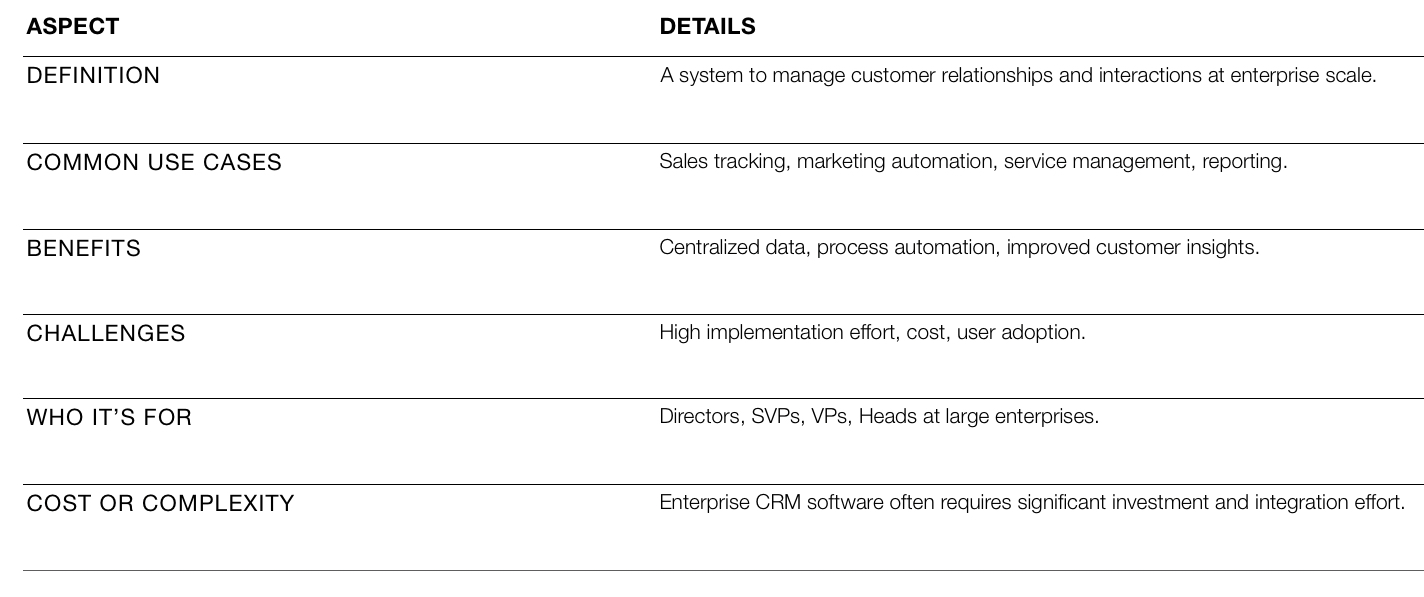
Enterprise CRM FAQs: Systems, Software & Solutions Guide
Many enterprise companies struggle to manage customer relationships efficiently. Disconnected systems, inconsistent data, and slow workflows often reduce team productivity and harm customer experiences.
This article explains enterprise CRM, including software, systems, platforms, and solutions. It answers common questions, clarifies terminology, and provides actionable insights for enterprise leaders. Directors, SVPs, VPs, and Heads at companies with 1,000+ employees will benefit from understanding how CRM can improve operations and customer engagement. By the end, readers will know which enterprise CRM approaches fit their business and how to evaluate options.
Market Context: Disruption & Opportunity
The enterprise CRM market is evolving rapidly. Organizations face pressure to unify customer data, automate processes, and deliver personalized experiences at scale. Many legacy systems fail to support integration or analytics needs, leaving companies behind competitors that adopt modern enterprise CRM platforms.
Enterprise CRM solutions now focus on flexibility, scalability, and advanced analytics. Companies that adopt these systems can streamline operations, improve sales effectiveness, and enhance customer satisfaction. Investing in the right enterprise CRM software is critical for enterprises seeking efficiency and growth in a competitive landscape.
FAQs Snapshot

What is enterprise CRM?
Enterprise CRM is a system designed to manage customer relationships, track interactions, and streamline workflows for large organizations. It connects sales, marketing, and service teams while storing customer data in a centralized platform. Enterprise CRM software helps teams deliver consistent experiences and improves decision-making.
Why is enterprise CRM important for large companies?
Enterprise companies manage complex customer interactions across multiple teams and channels. A CRM enterprise system centralizes data, reduces errors, automates repetitive tasks, and provides insights for strategic decisions. Without it, businesses risk missed opportunities and inconsistent customer experiences.
What are the best enterprise CRM solutions?
The best enterprise CRM solutions integrate seamlessly with existing systems, support analytics, and scale as your organization grows. Features often include automation, reporting, and multi-channel communication. Enterprises should evaluate platforms based on functionality, flexibility, and vendor support.
How do enterprise CRM systems differ from standard CRM software?
Enterprise CRM systems handle larger data volumes, offer advanced security, and support multi-team collaboration. Standard CRM software is often simpler, suitable for small or mid-sized companies. Enterprise platforms prioritize scalability, integration, and workflow customization.
Can enterprise CRM platforms scale with my business?
Yes, leading enterprise CRM platforms are designed for scalability. They support multiple departments, global operations, and large datasets. Scalable enterprise CRM software grows with your organization, reducing the need for system replacement as business needs expand.
Is enterprise CRM worth the investment?
Investing in enterprise CRM systems pays off by improving efficiency, customer satisfaction, and revenue tracking. Automation reduces manual work, centralized data informs strategy, and analytics highlight growth opportunities. The ROI often justifies upfront costs for enterprise organizations.
When should a company upgrade or switch CRM systems?
Companies should consider upgrading when existing systems lack integration, cannot scale, or fail to support analytics. Switching to modern enterprise CRM software ensures better performance, improved reporting, and a more consistent customer experience.
Benefits of Enterprise CRM
Enterprise CRM software provides a clear view of customer interactions, streamlines workflows, and improves communication across departments. Companies gain efficiency, reduce errors, and enhance customer satisfaction.
Specific benefits include:
- Centralized customer data for faster decision-making
- Automated workflows that reduce repetitive tasks
- Advanced reporting to identify trends and opportunities
- Improved collaboration between sales, marketing, and service teams
- Scalable systems that grow with business needs
- Integration with other enterprise systems to unify operations
Quick Summary Table

Let’s kickstart the conversation and design stuff people will love.

Deep-Dive Sections

What It Is & Why It Matters
Enterprise CRM systems manage customer data, track interactions, and automate workflows. They matter because large organizations face complex customer relationships across multiple teams. Proper CRM software improves productivity, insights, and customer experience.
How It Works
Enterprise CRM software centralizes data from sales, marketing, and service teams. It tracks leads, opportunities, and customer interactions. Automation handles routine tasks, and reporting tools provide actionable insights. Integration with other platforms enhances overall efficiency.
When to Use It (and When Not To)
Use enterprise CRM systems when managing high volumes of customer data or multi-team workflows. Avoid investing if your organization is small or processes are simple, as lighter CRM solutions may suffice.
Tools or Platforms Involved
Popular enterprise CRM platforms include Salesforce, Microsoft Dynamics 365, and Oracle NetSuite. These platforms provide scalable solutions with analytics, automation, and integration capabilities.
Cost Considerations
Enterprise CRM software requires upfront investment for licenses, customization, and training. Implementation may take months depending on system complexity. Long-term ROI comes from improved efficiency and revenue tracking.
Integration or Setup Requirements
Enterprise CRM systems must integrate with marketing, sales, service, and finance tools. Proper setup includes data migration, user training, and process alignment. A consulting partner can streamline integration and adoption.
Scalability & Flexibility
Modern enterprise CRM platforms scale across teams, regions, and global operations. Flexibility allows custom workflows, analytics, and reporting that adapt to evolving business needs.
Alternatives or Comparisons
Alternative options include mid-market CRMs or specialized software for sales or marketing. Enterprise platforms remain superior for large organizations needing centralized control, advanced analytics, and multi-department collaboration.
Trends
Current trends in enterprise CRM include AI-powered analytics, workflow automation, and omnichannel integration. Platforms now provide predictive insights and improved personalization for customers.
Pros and Cons
Pros: Centralized data, automation, analytics, scalability
Cons: High cost, complex implementation, training requirements
How G&Co. Can Help

G&Co. helps enterprise brands implement and optimize CRM systems. We provide strategic consulting, integration support, and operational guidance. Our team advises on platform selection, deployment, and workflow design. Talk to us to clarify your strategy and move forward with confidence.
Conclusion & Next Steps
This guide clarified enterprise CRM systems, software, solutions, and platforms. Leaders now understand what enterprise CRM offers, how it works, and when to implement it.
At G&Co., we’ve worked alongside clients to modernize CRM, improve customer journeys, and integrate systems. Our expertise translates trend awareness into measurable business advantage.
Still have questions? Reach out and let’s solve them together.






%20(1).png)




